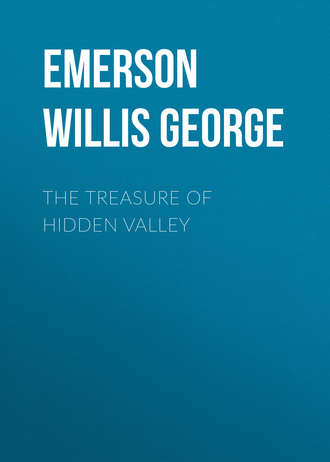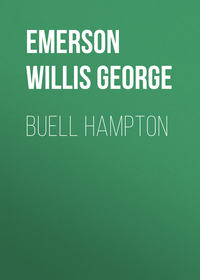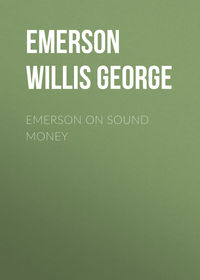 полная версия
полная версияThe Treasure of Hidden Valley
But there was no news, and meanwhile his wife had returned from her mission, to report that the Holdens, while sincerely grateful, had declined all offers of assistance. As Mrs. Miller described, it was the girl herself who had declared, with the light of quiet self-reliance in her eyes, that by working the ranch in Wyoming as she proposed to work it there would be ample provision for her father’s little luxuries and her own simple needs.
So Allen Miller put Gail Holden out of mind. But he had many secret heartaches over his rupture with Roderick, and every little stack of mail matter laid upon his desk was eagerly turned over in the hope that at last the wanderer’s whereabouts would be disclosed.
CHAPTER IV – THE COLLEGE WIDOW
STELLA RAIN belonged to one of the first families of Galesburg. Their beautiful home, an old style Southern mansion, painted white with green shutters, was just across from the college campus ground. It was the usual fate of seniors about to pass out of Knox College to be in love, avowedly or secretly, with this fair “college widow.” She was petite of form and face, and had a beautiful smile that radiated cheerfulness to the scores of college boys. There was a merry-come-on twinkle in her eyes that set the hearts of the young farmer lad students and the city chaps as well, in tumultuous riot. Beneath it all she was kind of heart, and it was this innate consideration for others that caused her to introduce all the new boys and the old ones too, as they came to college year after year, to Galesburg’s fairest girls. She was ready to fit in anywhere – a true “college widow” in the broadest sense of the term. Her parents were wealthy and she had no greater ambition than to be a queen among the college boys. Those who knew her best said that she would live and die a spinster because of her inability to select someone from among the hundreds of her admirers. Others said she had had a serious affair of the heart when quite young. But that was several years before Roderick Warfield had come upon the scene and been in due course smitten by her charms. How badly smitten he only now fully realized when, after nearly a year of absence, he found himself once again tête-à-tête with her in the old familiar drawing-room of her home.
There had been an hour of pleasant desultory conversation, the exchange of reminiscences and of little sympathetic confidences, a subtly growing tension in the situation which she had somewhat abruptly broken by going to the piano and dashing off a brilliant Hungarian rhapsody.
“And so you are determined to go West?” she inquired as she rose to select from the cabinet another sheet of music.
“Yes,” replied Roderick, “I’m going far West. I am going after a fortune.”
“How courageous you are,” she replied, glancing at him over her shoulder with merry, twinkling eyes, as if she were proud of his ambition.
“Stella,” said Roderick, as she returned to the piano, where he was now standing.
“Yes?” said she, looking up encouragingly.
“Why; you see, Stella – you don’t mind me telling you – well, Stella, if I find the lost gold mine – ”
“If you find what?” she exclaimed.
“Oh, I mean,” said Roderick in confusion, “I mean if I find a fortune. Don’t you know, if I get rich out in that western country – ”
“And I hope and believe you will,” broke in Stella, vivaciously.
“Yes – I say, if I do succeed, may I come back for you – yes, marry you, and will you go out there with me to live?”
“Oh, Roderick, are you jesting now? You are just one of these mischievous college boys trying to touch the heart of the little college widow.” She laughed gaily at him, as if full of disbelief.
“No,” protested Roderick, “I am sincere.”
Stella Rain looked at him a moment in admiration. He was tall and strong – a veritable athlete. His face was oval and yet there was a square-jawed effect in its moulding. His eyes were dark and luminous and frank, and wore a look of matureness, of determined purpose, she had never seen there before. Finally she asked: “Do you know, Roderick, how old I am?”
As Roderick looked at her he saw there was plaintive regret in her dark sincere eyes. There was no merry-come-on in them now; at last she was serious.
“Why, no,” said Roderick, “I don’t know how old you are and I don’t care. I only know that you appeal to me more than any other woman I have ever met, and all the boys like, you, and I love you, and I want you for my wife.”
“Sit down here by my side,” said Stella. “Let me talk to you in great frankness.”
Roderick seated himself by her side and reaching over took one of her hands in his. He fondled it with appreciation – it was small, delicate and tapering.
“Roderick,” she said, “my heart was given to a college boy when I was only eighteen years old. He went away to his home in an eastern state, and then he forgot me and married the girl he had gone to school with as a little boy – during the red apple period of their lives. It pleased his family better and perhaps it was better; and it will not please your family, Roderick, if you marry me.”
“My family be hanged,” said Roderick with emphasis. “I have just had a quarrel with my uncle, Allen Miller, and I am alone in the world. I have no family. If you become my wife, why, we’ll – . we’ll be a family to ourselves.”
Stella smiled sadly and said: “You enthusiastic boy. How old are you, Roderick?”
“I am twenty-four and getting older every day.” They both laughed and Stella sighed and said: “Oh, dear, how the years are running against us – I mean running against me. No, no,” she said, half to herself, “it never can be – it is impossible.”
“What,” said Roderick, rising to his feet, and at the same moment she also stood before him – “What’s impossible? Is it impossible for you to love me?”
“No, not that,” said Stella, and he noticed tears in her eyes. “No, Roderick,” and she stood before him holding both his hands in hers – “Listen,” she said, “listen!”
“I am all attention,” said Roderick.
“I will tell you how it will all end – we will never marry.”
“Well, I say we shall marry,” said Roderick. “If you will have me – if you love me – for I love you better than all else on earth.” He started to take her in his arms and she raised her hand remonstratingly, and said: “Wait! Here is what I mean,” and she looked up at him helplessly. “I mean,” – she was speaking slowly – “I mean that you believe today, this hour, this minute that you want me for your wife.”
“I certainly do,” insisted Roderick, emphatically.
“Yes, but wait – wait until I finish. I will promise to be your wife, Roderick – yes, I will promise – if you come for me I will marry you. But, oh, Roderick,” – and there were tears this time in her voice as well as in her eyes – “You will never come back – you will meet others not so old as I am, for I am very, very old, and tonight I feel that I would give worlds and worlds if they were mine to give, were I young once again. Of course, in your youthful generosity you don’t know what the disparagement of age means between husband and wife, when the husband is younger. A man may be a score of years older than a woman and all will be well – if they grow old together. It is God’s way. But if a woman is eight or ten years older than her husband, it is all different. No, Roderick, don’t take me in your arms, don’t even kiss me until I bid you good-by when you start for that gold’ mine of yours” – and as she said this she tried to laugh in her old way.
“You seem to think,” said Roderick in a half-vexed, determined tone, “that I don’t know my own mind – that I do not know my own heart. Why, do you know, Stella, I have never loved any other girl nor ever had even a love affair?”
She looked at him quickly and said: “Roderick, that’s just the trouble – you do not know – you cannot make a comparison, nor you won’t know until the other girl comes along. And then, then,” she said wearily, “I shall be weighed in the balance and found wanting, because – oh, Roderick, I am so old, and I am so sorry – ” and she turned away and hid her face in her hands. “I believe in you and I could love you with all my strength and soul. I am willing – listen Roderick,” she put up her hands protectingly, “don’t be impatient – I am willing to believe that you will be constant – that you will come back – I am willing to promise to be your wife.”
“You make me the happiest man in the world,” exclaimed Roderick, crushing her to him with a sense of possession.
“But there is one promise I am going to ask you to make,” she said.
“Yes, yes,” said he, “I will promise anything.”
“Well, it is this: If the other girl should come along, don’t fail to follow the inclination of your heart, for I could not be your wife and believe that the image of another woman was kept sacredly hidden away in the deep recesses of your soul. Do you understand?” There was something in her words – something in the way she spoke them – something in the thought, that struck Roderick as love itself, and it pleased him, because love is unselfish. Then he remembered that as yet he was penniless – it stung him. However, the world was before him and he must carve out a future and a fortune. It might take years, and in the meantime what of Stella Rain, who was even now deploring her many years? She would be getting older, and her chances, perhaps, for finding a home and settling down with a husband would be less and less.
But he knew there was no such thought of selfishness on her part – her very unselfishness appealed to him strongly and added a touch of chivalry to his determination.
Stella Rain sank into a cushioned chair and rested her chin upon one hand while, reaching to the piano keys with the other, she thrummed them softly. Roderick walked back and forth slowly before her in deep meditation. At last he paused and said: “I love you, I will prove I am worthy. There is no time to lose. The hour grows late. I have but an hour to reach my hotel, get my luggage and go to the depot I am going West tonight I will come for you within one year, provided I make my fortune; and I firmly believe in my destiny. If not – if I do not come – I will release you from your betrothal, if it is your wish that I do so.”
Stella Rain laughed more naturally, and the old “come-on” twinkling was in her eyes again as she said: “Roderick, I don’t want to be released, because I love you very, very much. It is not that – it’s because – well, no difference – if you come, Roderick,” and she raised her hand to him from the piano – “if you come, and still want me to be your wife, I will go with you and live in the mountains or the remotest corner of the earth.”
He took her hand in both his own and kissed it tenderly. “Very well, Stella, – you make it plain to me. But you shall see – you shall see,” and he looked squarely into her beautiful eyes.
“Yes,” she said, rising to her feet, “we shall see, Roderick, we shall see. And do you know,” the twinkling was now gone from her eyes once more and she became serious again – “do you know, Roderick, it is the dearest hope of my life that you will come? But I shall love you just as much as I do now, Roderick, if for any cause – for whatever reason – you do not come. Do you understand?”
“But,” interposed Roderick, “we are betrothed, are we not?”
She looked at him and said, smiling half sadly: “Surely, Roderick, we are betrothed.”
He put his big strong hands up to her cheeks, lifted her face to his and kissed her reverently. Then with a hasty good-by he turned and was gone.
As Roderick hurried across the old campus he felt the elation of a gladiator. Of course, he would win in life’s battle, and would return for Stella Rain, the dearest girl in all the world. The stars were twinkling bright, the moon in the heavens was in the last quarter – bright moon and stars, fit companions for him in his all-conquering spirit of optimism.
CHAPTER V – WESTWARD HO!
AS the train rumbled along carrying Roderick back to Burlington, he was lost in reverie and exultation. He was making plans for a mighty future, into which now a romance of love was interwoven as well as the romance of a mysterious gold mine awaiting rediscovery in some hidden valley among rugged mountains. Yes; he would lose no further time in starting out for Wyoming. The winning of the one treasure meant the winning of the other – the making of both his own. As he dreamed of wealth unbounded, there was always singing in his heart the name of Stella Rain.
Next day he was aboard a westbound train, booked for Rawlins, Wyoming, where, as his father’s letter had directed, he was likely to find the old frontiersman, Jim Rankin; perhaps also the other “cronies” referred to by name, Tom Sun and Boney Earnest At Omaha a young westerner boarded the train, and took a seat in the Pullman car opposite to Roderick. In easy western style the two fell into conversation, and Roderick soon learned that the newcomer’s name was Grant Jones, that he was a newspaper man by calling and resided in Dillon, Wyoming, right in the midst of the rich copper mines.
“We are just over the mountain,” explained Jones, “from the town of Encampment, where the big smelter is located.”
As the train sped along and they became better acquainted, Grant Jones pointed out to Roderick a dignified gentleman with glasses and a gray mustache occupying a seat well to the front of the car, and told him that this particular individual was no other than the “Boss of Montana” – Senator “Fence Everything” Greed. Jones laughed heartily at the name.
“Of course, he is the U. S. Senator from Montana,” continued Jones, soberly, “and his name is F. E. Greed. His enemies out in Montana will be highly pleased at the new name I have given him – ’Fence Everything,’ because he has fenced in over 150,000 acres of Government land, it is claimed, and run the actual home-settlers out of his fenced enclosures while his immense herds of cattle trampled under foot and ate up the poor evicted people’s crops. Oh, he’s some ‘boss,’ all right, all right.”
“Why,” exclaimed Roderick, “that’s lawlessness.”
Grant Jones turned and looked at Roderick and said: “The rich are never lawless, especially United States Senators – not out in Montana. Why, bless your heart, they say the superintendent of his ranch is on the payroll down at Washington at $1800 a year.
“Likewise the superintendent of the electric lighting plant which Senator Greed owns, as well as the superintendent of his big general store, are said to be on the government payroll.
“It has also been charged that his son was on the public payroll while at college. Oh, no, it is not lawless; it is just a dignified form of graft. Of course,” Jones went on with arched eyebrows, “I remember one case where a homesteader shot one of the Senator’s fatted cattle – fine stock, blooded, you know. It was perhaps worth $100. Of course the man was arrested, had a ‘fair trial’ and is now doing time in the penitentiary. In the meantime, his wife and little children have been sent back East to her people. You see,” said Jones, smiling, “this small rancher, both poor in purse and without influence, was foolish enough to lose his temper because five or six hundred head of Senator Greed’s cattle were driven by his cowboys over the rancher’s land and the cattle incidentally, as they went along, ate up his crops. Little thing to get angry about, wasn’t it?” and Jones laughed sarcastically.
“Well, don’t the state conventions pass resolutions denouncing their U. S. Senator for such cold-blooded tyrannizing methods?”
“If the state of Montana,” replied Grant Jones, “should ever hold a state convention of its representative people – the bone and sinew of its sovereign citizens, why, they would not only retire Senator Greed to private life, but they would consign him to the warmer regions.”
“You surprise me,” replied Roderick. “I supposed that every state held conventions – delegates you know, from each county.”
“They think they do,” said Jones, winking one eye, “but they are only ratification meetings. The ‘Boss,’”he continued, nodding his head towards Senator Greed, “has his faithful lieutenants in each precinct of every county. His henchmen select the alleged delegates and when they all get together in a so-called state convention they are by pre-arrangement program men. The slate is fixed up by the ‘Boss’ and is duly ratified without a hitch. Therefore instead of being a convention representing the people it is a great big farce – a ratification picnic where ‘plums’ are dealt out and the ears of any who become fractious duly cuffed.”
At Grand Island in the afternoon, during a stop while engines were changed, Roderick left the train and stretched his legs by walking up and down the depot platform. Here he saw Grant Jones in a new rôle. Notwithstanding Jones was in rough western garb – khaki Norfolk coat, trousers to match, and leather leggings – yet he was the center of attraction for a bevy of young ladies. Two of these in particular were remarkable for their beauty; both had the same burnished golden hair and large brown eyes; they were almost identical in height and figure, petite and graceful, dressed alike, so that anyone at a first glance would have recognized them to be not only sisters but doubtless twins.
When the train was about ready to start, these two girls bade adieu to their numerous friends and permitted Grant Jones with all the gallantry of a Beau Brummel to assist them onto the car.
Later Grant Jones took great pains to assure Roderick that it was a pleasure to introduce him to the Misses Barbara and Dorothy Shields – “Two of our’ mountain wild flowers,” Grant said, laughing pleasantly, “who reside with their people way over south in the Wyoming hills, not far from Encampment, on one of the biggest cattle ranges in the state.”
Roderick, already captivated by the whole-souled, frank manner of Grant Jones, now found himself much interested in the beautiful twin sisters as well. Hour followed hour in bright and sprightly conversation, and soon the tenderfoot who had been inclined to condole with himself as a lonely stranger among strangers was feeling quite at home in the great western world of hospitable welcome and good comradeship.
At an early hour next morning Grant Jones, the Shields girls and a dozen other people left the train at the little town of Walcott. They extended hearty invitations for Roderick to come over to southern Wyoming to see the country, its great mines and the big smelter. “If you pay us a visit,” said Grant Jones, laughing, “I’ll promise you a fine big personal in the Dillon Doublejack, of which mighty organ of public opinion I have the honor to be editor.”
Roderick, with a bow of due reverence for his editorial majesty and a bright smile for the sisters, promised that he likely would make the trip before very long. Then he swung himself onto the already moving train and continued his westward journey to Rawlins.
CHAPTER VI – RODERICK MEETS JIM RANKIN
IT was seven o’clock the same morning when Roderick left the train at Rawlins.
The raw, cold wind was blowing a terrific gale, the streets were deserted save for a few half drunken stragglers who had been making a night of it, going the rounds of saloons and gambling dens.
A bright-faced lad took charge of the mail bags, threw them into a push cart and started rumbling away up the street. Warfield followed and coming up with him inquired for a hotel.
“Right over there is the Ferris House,” said the young fellow, nodding his head in the direction indicated.
As Roderick approached the hotel he met a grizzled keen-eyed frontiersman who saluted him with a friendly “Hello, partner, you be a stranger in these yere parts, I’m assoomin’.”
“Yes, I just arrived on this morning’s train.”
“Waal, my handle is Jim Rankin. Been prospectin’ the range hereabouts nigh thirty years; uster be sheriff of this yere county when people wuz hostile a plenty – have the best livery stable today in Wyomin’, and always glad to see strangers loiterin’ ‘round and help ‘em to git their bearin’s if I can be of service – you bet I am.”
Thus early had Roderick encountered his father’s old friend. He was delighted, but for the present kept his own counsel. A more fitting time and place must be found to tell the reason of his coming.
“Thank you,” he contented himself with saying as he accepted the frontiersman’s hand of welcome; “glad to meet you, Mr. Rankin.”
“Here, boy,” shouted the latter to an attache of the hotel, “take care of this yere baggage; it belongs to this yere gentleman, a dangnation good friend uv mine. He’ll be back soon fur breakfast. Come on, stranger, let’s go over to Wren’s. I’m as dry as a fish.”
Roderick smiled and turning about, accompanied his new discovery down the street to Wren’s. As they walked along Rankin said: “Here’s my barn and here’s the alley. We’ll turn in here and get into Wren’s by the back door. I never pester the front door. Lots uv fellers git a heap careless with their artillery on front steps that are docile ‘nuff inside.” As they passed through a back gate, Jim Rankin, the typical old-time westerner, pushed his hat well back on his head, fished out of his pocket a pouch of “fine cut” tobacco, and stowing away a large wad in his mouth began masticating rapidly, like an automobile on the low gear. Between vigorous “chaws” he observed that the sun would be up in a “minute” and then the wind would go down. “Strange but true as gospel,” he chuckled – perhaps at his superior knowledge of the West – “when the sun comes up the wind goes down.”
He expectorated a huge pit-tew of tobacco juice at an old ash barrel, wiped his iron gray mustache with the back of his hand, pushed open the back door of the saloon and invited Roderick to enter.
A fire was burning briskly in a round sheet iron stove, and a half dozen wooden-backed chairs were distributed about a round-topped table covered with a green cloth.
Rankin touched a press button, and when a white-aproned waiter responded and stood with a silent look of inquiry on his face the frontiersman cleared his throat and said: “A dry Martini fur me; what pizen do you nominate, partner?”
“Same,” was Roderick’s rather abbreviated reply as he took in the surroundings with a furtive glance.
As soon as the waiter retired to fill the orders, Roderick’s new found friend pulled a coal scuttle close to his chair to serve as a receptacle for his tobacco expectorations, and began: “You see, speakin’ wide open like, I know all these yere fellers – know ‘em like a book. Out at the bar in front is a lot uv booze-fightin’ sheep herders makin’ things gay and genial, mixin’ up with a lot uv discharged railroad men. Been makin’ some big shipments uv sheep east, lately, and when they get tumultuous like with a whole night’s jag of red liquor under their belt, they forgit about the true artickle uv manhood and I cut ‘em out. Hope they’ll get away afore the cattle men come in from over north, otherwise there’ll be plenty uv ugly shootin’. Last year we made seven new graves back there,” and he jerked his thumb over his shoulder, “seven graves as a result uv a lot uv sheep herders and cow punchers tryin’ to do the perlite thing here at Wren’s parlors the same night They got to shootin’ in a onrestrained fashion and a heap careless. You bet if I wuz sheriff uv this yere county agin I’d see to it that law and order had the long end uv the stick – though I must allow they did git hostile and hang Big Nose George when I wuz in office,” he added after a pause. Then he chuckled quietly to himself, for the moment lost in retrospection.
Presently the waiter brought in the drinks and when he retired Rankin got up very cautiously, tried the door to see if it was tightly shut. Coming back to the table and seating himself he lifted his glass, but before drinking said: “Say, pard, I don’t want to be too presumin’, but what’s your handle?”
Roderick felt that the proper moment had arrived, and went straight to his story.
“My name is Roderick Warfield. I am the son of John Warfield with whom I believe you had some acquaintance a number of years ago. My father is dead, as you doubtless may have heard – died some fourteen years since. He left a letter for me which only recently came into my possession, and in the letter he spoke of three men – Jim Rankin, Tom Sun and Boney Earnest.”
As Roderick was speaking, the frontiersman reverently returned his cocktail to the table.





